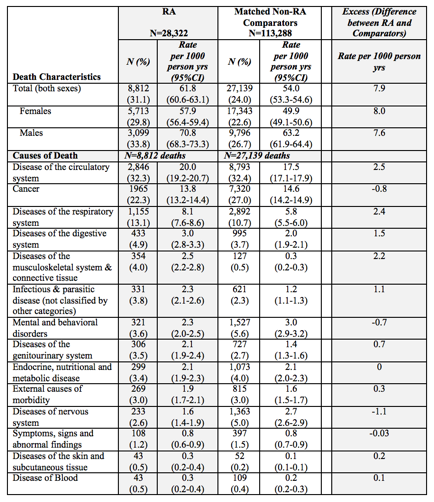Session Information
Session Type: ARHP Concurrent Abstract Session
Session Time: 2:30PM-4:00PM
Background/Purpose: Information on causes of death can assist in monitoring health trends and discovering health gaps. Our aim was to determine the primary causes of death among RA patients and to ascertain whether there are patterns in causes of death that differ from the general population.
Methods: We performed a population-based study using Ontario health administrative databases from 2000 to 2013. We identified an inception cohort of 28,322 RA patients (aged 66 years or older) using a validated algorithm (requiring 3 diagnostic codes over a 2 year period, with at least one provided by a specialist). To each RA patient we matched four non-RA general population comparators according to age, sex and region of residence. RA patients and comparators were followed for 142,534 and 502,823 person years, respectively. Vital statistics were used to identify the date and primary cause of death, which we tabulated according to International Classification of Disease Chapter. All-cause, cause-specific, and excess mortality rates were estimated.
Results: During a median follow-up of 4 years, 8,812 (31%) RA patients and 27,139 (24%) comparators died, with corresponding mortality rates of 61.8 (95%CI 60.6-63.1) and 54.0 (95%CI 53.3-54.6), per 1,000 person years, respectively (Table). Mortality rates were highest among males in both groups. The leading causes of death were similar in both groups, with circulatory system diseases, cancer, and respiratory diseases being the most frequent causes of death. Excess mortality rates in RA were observed for circulatory, respiratory, musculoskeletal, and digestive diseases, as well as infections.
Conclusion: Our findings corroborate previous studies illustrating that circulatory system diseases, cancer, and respiratory diseases (including pneumonia) remain the leading causes of mortality in RA. While we observed similar patterns of the leading primary causes of death in RA and comparators from the general population, the excess cause-specific mortality in RA warrants further investigation in order to identify modifiable factors in reducing inequalities in survival. 
To cite this abstract in AMA style:
Widdifield J, Paterson M, Huang A, Kuriya B, Thorne C, Pope JE, Bombardier C, Bernatsky S. Causes of Death for Patients with Rheumatoid Arthritis [abstract]. Arthritis Rheumatol. 2016; 68 (suppl 10). https://acrabstracts.org/abstract/causes-of-death-for-patients-with-rheumatoid-arthritis/. Accessed .« Back to 2016 ACR/ARHP Annual Meeting
ACR Meeting Abstracts - https://acrabstracts.org/abstract/causes-of-death-for-patients-with-rheumatoid-arthritis/
